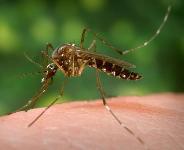Article By: Whitney Cherry
4-H Agent Calhoun County
I know COVID-19 has been driving public and private discussion as of late. But, we have to stay vigilant in working against all public health threats. One of those threats we typically start talking about this time of year is mosquito borne illnesses and preventative mosquito control. Not only are mosquitoes pests, but they can transmit some pretty nasty diseases we wouldn’t want under normal circumstances. But with our healthcare system currently inundated with COVID-19 patients, we certainly wouldn’t want to unnecessarily add to the burden.

Adult female yellow fever mosquito, Aedes aegypti (Linnaeus), in the process of seeking out a penetrable site on the skin surface of its host.
Credit: James Gathany, Center for Disease Control Public Health Image Library Source: https://edis.ifas.ufl.edu/in792
So what’s the reality? While the incidence of mosquito borne illness is much lower with the advent of modern medicine and basic public practices of wearing bug spray and dumping or treating standing water, it’s definitely not unheard of. The Zika scare is not such a distant memory after all. And EEE (eastern equine encephalitis) was at an unusual high last year in horses in the panhandle. So what can we do?
With recent flooding in some areas and the weather warming, we can expect to see increasing populations of mosquitoes. Additionally, as the weather warms, we all tend to spend more time outside, increasing our likelihood of mosquito bites. Further exacerbating the situation is the widespread quarantine measures keeping many of us home. The late afternoon and early evening hours bring ideal weather to step outside and enjoy a little time away from TV and computer screens. We encourage fresh air and exercise outdoors, but we also encourage basic safety. So wear bug spray if you’re outside early morning and especially near, during, or shortly after dusk. Wear long sleeves and pants and socks if you can stand it. And keep standing water dumped out of containers on your property. If this isn’t possible, look for safe water treatment options. The most prevalent spreaders of disease (Aedes aegypti) actually require these containers of water to complete their lifecycle.
For more information on this or other Extension-related topics, call or email your local extension office.
Related information: http://edis.ifas.ufl.edu/results.html?q=mosquito+borne+illness&x=0&y=0#gsc.tab=0&gsc.q=mosquito%20borne%20illness&gsc.page=1
- Rattlesnakes on Our Barrier Islands; Part 5 – Reproduction - January 12, 2026
- Rattlesnakes on Our Barrier Islands; Part 4 – Thermoregulation - December 29, 2025
- Rattlesnakes on Our Barrier Islands; Part 3 – Envenomation - December 22, 2025
